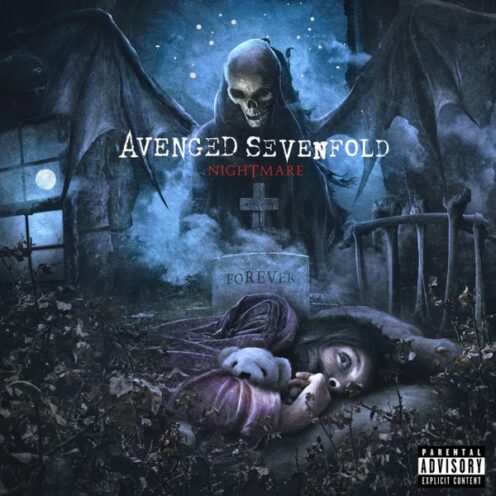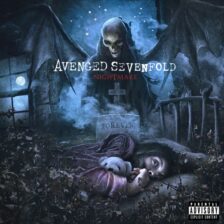Avenged Sevenfold have returned with the new single “Nobody.” The song comes from the upcoming album, Life Is But a Dream, due out June 2nd.
Read More “Avenged Sevenfold – “Nobody” Video”NOFX Announce Livestream Lineup
Laura Jane Grace, Avenged Sevenfold, Bad Cop/Bad Cop and more have all been announced for NOFX’s upcoming livestream.
Read More “NOFX Announce Livestream Lineup”Review: Avenged Sevenfold – Nightmare
The death of a loved one is a nightmare come to life. It’s something that can completely devastate you, leaving you feeling empty and forever changing life as you know it. While there is that overwhelming sadness, sometimes loss causes those left behind to do something special in their own lives. They find the strength to push forward and honor those who are no longer here.
For Avenged Sevenfold, they suffered a tragedy on December 28, 2009 when their drummer, Jimmy “The Rev” Sullivan, died at the age of 28 from an accidental opioid overdose. The Rev had become widely known as one of the best drummers in the metal scene, and his death stunned the world. Avenged Sevenfold had become a household name at this point, thanks to the success of their albums City of Evil and the self-titled Avenged Sevenfold. They were becoming one of the biggest rock bands in the world and just as they were in the process of making a new album, Avenged Sevenfold lost one of their brothers.
Read More “Avenged Sevenfold – Nightmare”Avenged Sevenfold Shares Op-Ed
M. Shadows of Avenged Sevenfold has penned an op-ed for Revolver:
I understand that the Avenged Sevenfold fanbase is made up of very few black Americans. That is why I feel more compelled than ever to write this to you. We can be the ones — the rock and metal community — to reach out and show the compassion that I know is in us all to help raise up our fellow humans. I, for one, enjoy black American culture. The music, art, films, clothing, sports, food. All of it has made my life better. I have no doubt we are a better country because of the black American influence. Hell, Chuck Berry was the Father of Rock & Roll! Standing against inequality and systemic racism is the very least we can all do.
Avenged Sevenfold – “Set Me Free”
Avenged Sevenfold have shared the previously unreleased song “Set Me Free.”
Avenged Sevenfold Launch New Series
Avenged Sevenfold have announced a new video series.
Avenged Sevenfold Re-Mix “Mad Hatter”
Avenged Sevenfold have released a new mix of “Mad Hatter.” A message from M. Shadows, along with a download to the new version of the song, can be found below.
Avenged Sevenfold Cancel Summer Tour
Avenged Sevenfold have been forced to cancel their summer tour. A message from singer M. Shadows can be found below.
Prophets of Rage Announce Tour With Avenged Sevenfold
Prophets of Rage and Avenged Sevenfold have announced a co-headlining tour. Three Days Grace are opening.
Read More “Prophets of Rage Announce Tour With Avenged Sevenfold”
Avenged Sevenfold Release Acoustic Album
Avenged Sevenfold have released a new acoustic album on Spotify and Apple Music.
Avenged Sevenfold Announce Deluxe Album
Avenged Sevenfold will be releasing a deluxe version of The Stage on December 15th. Details for the album can be found below.
Avenged Sevenfold Cover Pink Floyd
Avenged Sevenfold have released their cover of Pink Floyd’s “Wish You Were Here.”
Avenged Sevenfold Cover The Rolling Stones
How Avenged Sevenfold’s Lawsuit Could Upend Record Deals Everywhere
Eriq Gardner, writing for The Hollywood Reporter:
What’s a record label actually good for? That is a question implied in a lawsuit between Warner Bros. Records and Avenged Sevenfold, a heavy metal band from Huntington Beach, California, that is scheduled to go to trial this year and has the potential to upend the music industry.
The dispute dates back to 2015, when the act notified its label that it was terminating the contract it signed in 2004, citing the “seven-year rule,” which bars personal service contracts lasting longer than seven years. The law has its roots in a pro-labor statute put on the books after the Civil War to prevent long-term contracts from becoming the means for involuntary servitude. The modern version of the rule was famously tested in entertainment in 1944, when Olivia de Havilland used the law to break her contract with Warner Bros after the studio repeatedly suspended her for turning down roles. An appeals court decision helped bring an end to Hollywood’s old studio system.
Avenged Sevenfold Cover The Beach Boys
Avenged Sevenfold have released their cover of The Beach Boys “God Only Knows.”



